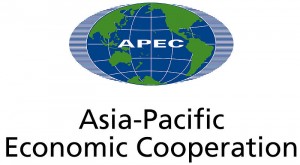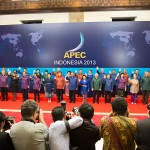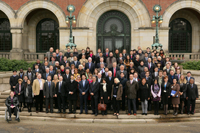 After attending the workshop on the benefits of adopting the Apostille Convention, USA representative for APEC observed that APEC’s Economic Committee clearly favors full participation in the Hague Apostille Convention. This is because the committee believes that the adoption of the Hague Apostille will positively strengthen the EoDB (Easy of Doing Business) program, promote international connectivity, and fall in line with APEC’s broader goals of liberalizing international trade and investment.
After attending the workshop on the benefits of adopting the Apostille Convention, USA representative for APEC observed that APEC’s Economic Committee clearly favors full participation in the Hague Apostille Convention. This is because the committee believes that the adoption of the Hague Apostille will positively strengthen the EoDB (Easy of Doing Business) program, promote international connectivity, and fall in line with APEC’s broader goals of liberalizing international trade and investment.
Apostille Convention
Paraguay finally accepts the 1961 Hague Apostille Convention
 Over fifty years after the Hague Convention of 5 October 1961 Abolishing the Requirement of Legalisation for Foreign Public Documents (the “Apostille Convention”), Paraguay officially adopted the Apostille Convention and has deposited its instrument of acceptance on December 10th, 2013. However, the Hague Convention will not come into effect until 30 August 2014 for Paraguay.
Over fifty years after the Hague Convention of 5 October 1961 Abolishing the Requirement of Legalisation for Foreign Public Documents (the “Apostille Convention”), Paraguay officially adopted the Apostille Convention and has deposited its instrument of acceptance on December 10th, 2013. However, the Hague Convention will not come into effect until 30 August 2014 for Paraguay.
The International Chamber of Commerce Urges Countries to Ratify Apostille Convention
 The International Chamber of Commerce (ICC) has urged countries to ratify the Apostille Convention for simplified certification of international documents. International shipping of goods require significant paperwork whose origin often require authenticating by third parties and foreign officials. The Apostille treaty replaces the lengthy and expensive process of legalizing documents that are often involved in a chain of certificates. The Apostille cuts through a country of origin’s red tape by certifying the documents authenticity to foreign administrations.
The International Chamber of Commerce (ICC) has urged countries to ratify the Apostille Convention for simplified certification of international documents. International shipping of goods require significant paperwork whose origin often require authenticating by third parties and foreign officials. The Apostille treaty replaces the lengthy and expensive process of legalizing documents that are often involved in a chain of certificates. The Apostille cuts through a country of origin’s red tape by certifying the documents authenticity to foreign administrations.
With the Hague Conference’s recommendations on International Private Law, the ICC has encouraged countries to apply to the Apostille Convention in all circumstances where legalization was required and urged countries who have not joined to join the Convention.
The ICC supports the current procedure in many countries of issuing Apostilles for international documents including health certificates, certificates of conformity/origin, and import/export licenses though the scope of the Convention treaty does not include administrative documents directly dealing with customs/commercial operations.
APEC Member Economies Show Support for Apostille Convention Following Workshop
 In June 2013, the APEC Committee and the Asia Pacific Regional Office of the Hague Conference sponsored the Department of Justice of Hong Kong to host a workshop on the Apostille Convention for representatives of Member Economies of APEC. During the workshop, members learned about the benefits of adopting the Apostille Convention. Mainly, adopting the Apostille Convention will boost the effectiveness of APEC’s current initiative, the EoDB (Easy of Doing Business). This program will improve by making it easier to process international transactions and trading.
In June 2013, the APEC Committee and the Asia Pacific Regional Office of the Hague Conference sponsored the Department of Justice of Hong Kong to host a workshop on the Apostille Convention for representatives of Member Economies of APEC. During the workshop, members learned about the benefits of adopting the Apostille Convention. Mainly, adopting the Apostille Convention will boost the effectiveness of APEC’s current initiative, the EoDB (Easy of Doing Business). This program will improve by making it easier to process international transactions and trading.
Following the workshop at the APEC summit in Bali, Indonesia, the APEC Ministers maintained their positive opinion of the Apostille Convention. This is a good indicator that APEC will fully adopt the Apostille Convention within the next year or so.
Excellent Turnout at Apostille Convention Meeting on the Practical Operation of the Apostille Convention
 The third meeting of the Apostille Convention’s Special Commission on the practical operation of the Hague Convention on Abolishing the Requirement of Legalization for Foreign Public Documents was held during November 6~9, 2012. Over 160 experts from 75 States and international organizations attended the meeting.
The third meeting of the Apostille Convention’s Special Commission on the practical operation of the Hague Convention on Abolishing the Requirement of Legalization for Foreign Public Documents was held during November 6~9, 2012. Over 160 experts from 75 States and international organizations attended the meeting.
Of all conventions ratified by the Hague Convention, the Apostille Convention has been the most widely ratified (with 104 Contracting States). This is mainly due to Apostille’s relevance with people’s daily lives as well as cross-border business. The Convention has simplified the process of producing public documents abroad, including civil status certificates and notarial acts, as well as facilitate the circulation of public documents issued by one Contracting State for use in another, thus gaining extreme popularity throughout the world.
The Special Commission meeting allowed the Contracting States and interested international organization to discuss the Apostille Conventions’ operations. The discussed subjects included the applicability of the Convention, options that can further simplify the Apostille process, and options for the potential globalization of the successful electronic Apostille Program (e-APP), which is an innovative technological solution for modernizing existing Apostille procedures. To help designated Competent Authorities perform their functions under the Apostille Convention, the meeting also approved the final text of a Handbook on practical operation of the Apostille Convention.
Currently, more than 150 Competent Authorities throughout 15 Contracting States have already implemented at least one of the components of the Apostille Convention. Furthermore, thousands of e-Apostilles have been issued.